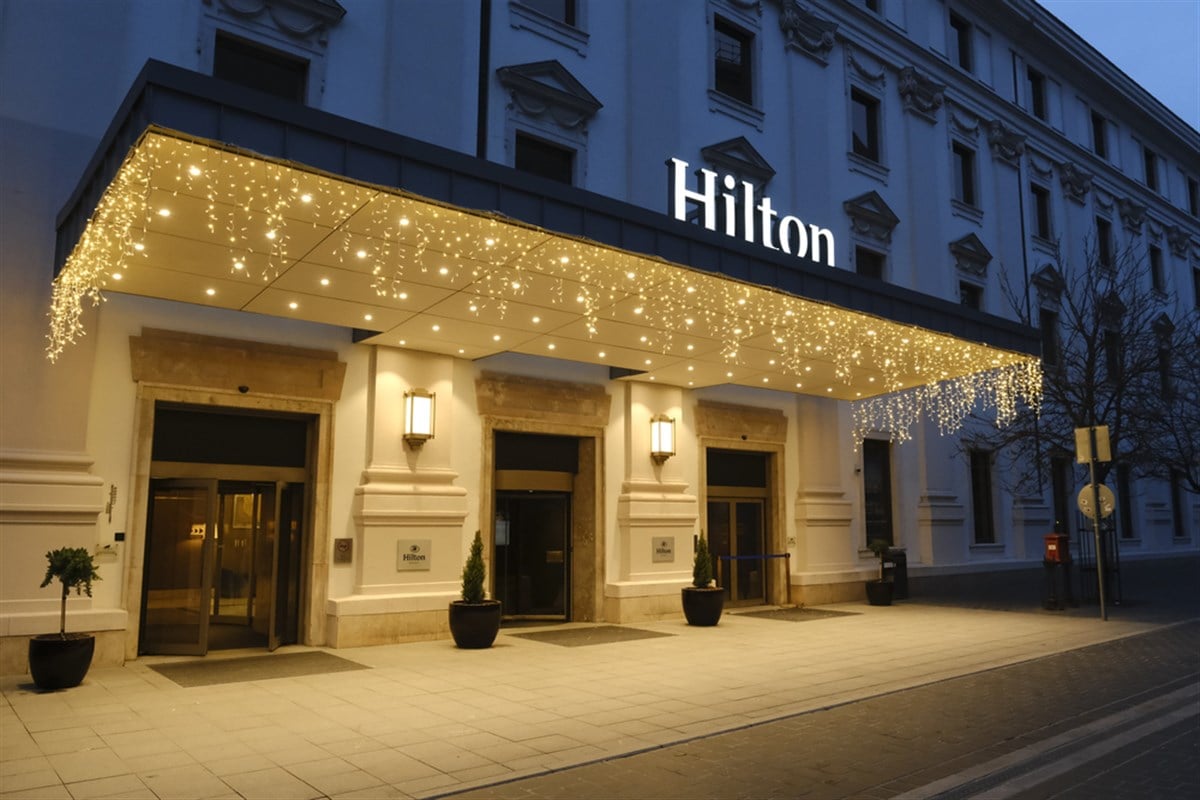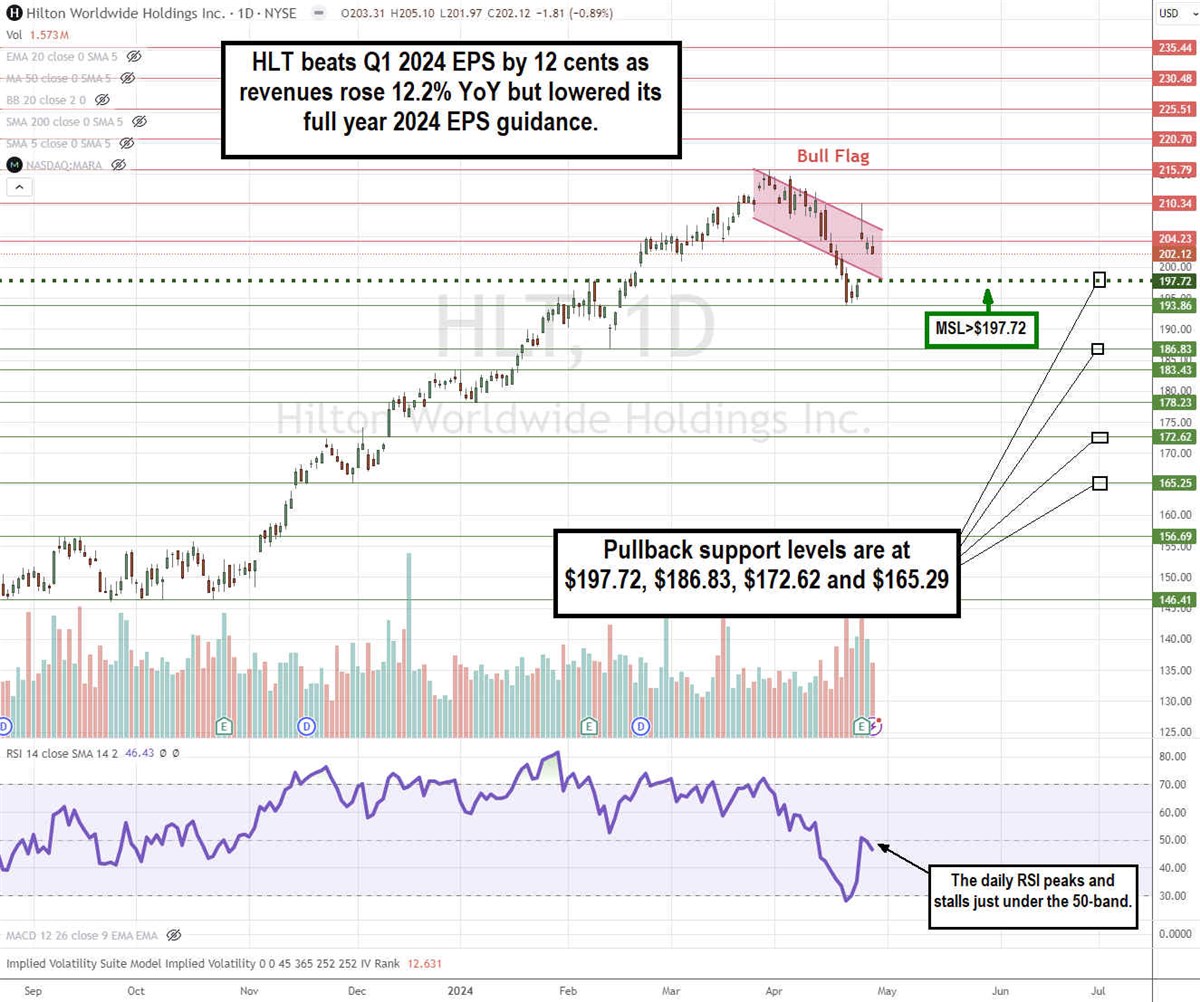 Hilton Worldwide Holdings Inc. (NYSE: HLT) is a global hospitality company operating over 7,600 hotels and resorts in 126 countries under more than 20 different brands. The consumer discretionary sector giant runs an asset-light business, owning only 3% of its hotels and franchising the other 97%. Hospitality and lodging struggled during the pandemic and is one of the last industries to experience positive normalization. But it has bounced back with a vengeance; airlines, cruise ships, casinos and hotels are thriving in the post-pandemic era from the travel boom after years of pent-up demand.
Hilton Worldwide Holdings Inc. (NYSE: HLT) is a global hospitality company operating over 7,600 hotels and resorts in 126 countries under more than 20 different brands. The consumer discretionary sector giant runs an asset-light business, owning only 3% of its hotels and franchising the other 97%. Hospitality and lodging struggled during the pandemic and is one of the last industries to experience positive normalization. But it has bounced back with a vengeance; airlines, cruise ships, casinos and hotels are thriving in the post-pandemic era from the travel boom after years of pent-up demand.
The Asset Light Hotel Industry Model
The hotel industry has transformed from the days of brands owning and operating their hotels to just operating or even leasing their brand. The major hospitality players, including Marriott International Inc. (NASDAQ: MAR), Hyatt Hotels Co. (NYSE: H) and Choice Hotels Inc. (NYSE: CHH), run under an asset-light franchise model. This makes them agile, with very little to tie them down as they continue to ramp up pipelines of hundreds of thousands of rooms to build, convert and upgrade. Capex is low and profits are high under the franchise model. The actual owners of the property are often real estate investment trusts (REITs), institutions and even individual investors.
Brands for Every Demographic
Hilton operates 22 brands that accommodate different price ranges, destinations and income demographics. Its essential, budget-friendly lower-end accommodations include the Hilton Garden Inn, Hampton, Tru and Spark, which often include free complimentary breakfasts.
The next step up is the Embassy Suites, Homewood Suites and extended stay brand LivSmart Studios. Home2 Suites also allow for pets and feature a kitchen and full-sized fridge. Its local neighborhood and urban hotels include Canopy, Tempo and Motto.
Hilton's premium brands include its namesake Hilton Hotels & Resorts and DoubleTree, and its bespoke designer hotels include the CURIO and TAPESTRY collections. The high-end luxury brand hotels and resorts include the Waldorf Astoria, LXR, Conrad and Signia.
Expansion Pipeline Is the Metric to Watch
You may have noticed that many hotel giants lowered their forward revenue guidance, but the market still took shares higher. This is likely due to the development pipeline. Hotels are known to lowball estimates, so the expansion pipeline is the key metric to determine potential growth prospects.
For example, Marriott lowered their Q4 2023 EPS consensus estimate from $2.19 to between $2.04 and $2.13, yet shares surged to all-time highs in the weeks following its Q3 2023 earnings release. That’s because it has one of the largest pipelines with 3,400 properties and 573,000 rooms, up 15% YOY.
Competitor Hyatt has a pipeline of 650 properties and 127,000 rooms. The pipeline isn't new construction. It can also include remodels, upgrades, conversions and new properties joining under the brand umbrella.

Daily Bull Flag
HLT formed a daily bull flag pattern. The flagpole peaked at $215.79, forming parallel descending upper and lower trendline lines. HLT accelerated to the downside heading into its earnings release but triggered a daily market structure low (MSL) breakout into the release at $197.72, which caused a gap to $210.34. The daily relative strength index (RSI) peaked at the 50-band and is stalling for a potential bounce or oscillation back down. Pullback support levels are at $197.72, $186.83, $172.62 and $165.29.
Earnings Momentum Continues
[content-module:CompanyOverview|NYSE:HLT]Hilton reported a Q1 2024 EPS of $1.53, beating analyst estimates by 12 cents. Revenues rose 12.2% YOY to $2.57 billion, beating $2.61 billion consensus estimates. Revenue per available room (RevPAR) rose 2%, which was impacted by inclement weather, holidays and renovations. In the quarter, Hilton opened 106 hotels with 16,800 rooms leading to 14,200 net additions. Hilton is acquiring Graduate Hotels brand of 35 franchised hotels. It also expanded its luxury portfolio with a controlling stake in London-based Sydell Group, which owns the Nomad hotel brand. This marks its debut in the luxury lifestyle segment.
Development Pipeline
Hilton saw great momentum across signings, starts and openings in the pipeline. The development pipeline added 29,800 rooms for a total of 3,380 hotels and 472,300 rooms in 119 countries. Hilton added 31 new countries and territories that is hasn't had any properties on beforehand. There are 229,700 rooms under construction, and 267,900 rooms are international. The record pipeline growth should result in a net unit growth of 6% to 6.% for the full year.
Downside Guidance
Hilton issued Q2 2024 EPS guidance of $1.80 to $1.86 versus $1.87 consensus estimates. Full-year 2024 EPS is expected between $6.89 to $7.03 versus $7.10 consensus estimates. Systemwide comparable RevPAR is expected to rise 2% to 4%. Adjusted EBITDA is expected between $3.375 billion to $3.425 billion.
CEO Commentary
Hilton CEO Chris Nassetta admitted the 2% RevPAR was on the low end of their guidance, however, leisure transient RevPAR exceeded expectations despite tough YOY comps. The business transient recovery was steady as RevPAR rose 5% YOY. Corporate groups continue to grow as a percentage of the booking with windows continues to lengthen. System-wide construction starts improved 45% YOY as half its pipeline us under construction. Hilton has more rooms under construction than any other hotel company.
Nassetta said, “To provide even more personalized experiences for our guests, we continue to leverage our industry-leading technology platforms. From a digitally enabled concierge for our luxury brands, to the ability to choose your room from a floor plan and control your in-room entertainment from your mobile device, we continue to fully integrate the digital experience.” The Hilton Honors loyalty program has nearly 190 million members worldwide.
Hilton analyst ratings and price targets are at MarketBeat.